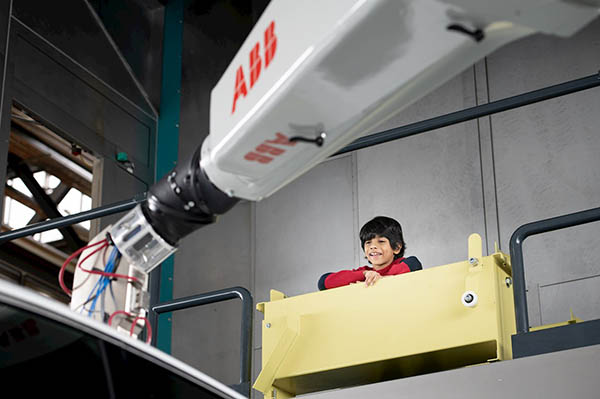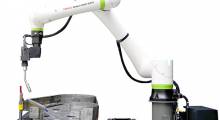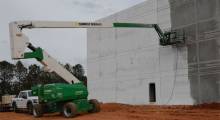ABB Robotics yesterday announced that it has collaborated with two artists to create what it claimed was “the world's first robot-painted art car.” The company's PixelPaint technology recreated, without human intervention, the swirling, monochromatic design of a child prodigy and the tri-color geometric pattrens of digital design collective.
“ABB’s PixelPaint technology is more than an evolution—it is a revolution,” said Sami Atiya, president of ABB’s Robotics & Discrete Automation business area. “It’s a shining example of how robotic automation and our RobotStudio software can not only pave the way for more sustainable manufacturing but can also perfectly replicate delicate pieces of art that celebrate the originality and beauty of the human spirit.”
“At a time when consumers want more customized products, PixelPaint is a game changer and allows any design to be replicated in a manner that is both sustainable and affordable,” Atiya said.
ABB Robotics has shipped more then 500,000 robots to industrial customers ranging from automotive and electronics to logistics. The Auburn Hills, Mich.-based unit of ABB Ltd. said it helps businesses of all sizes to increase productivity, flexibility, and simplicity and to improve output quality. ABB Robotics employs more than 10,000 people at over 100 locations in more than 53 countries.
PixelPaint offers precision, sustainability
Multi-colored car painting has traditionally been a laborious and costly process involving multiple stages of masking and unmasking. ABB said its PixelPaint technology “reimagines” the paint application process and reflects the growing demand for sustainable personalization in the automotive industry, particularly in exterior paint.
PixelPaint allows for a detailed, colorful, and exact replication of any design, according to the company. Carefully controlled, the paint can be quickly applied in a single application. This advancement in automating the painting process could allow for specialized and personalized designs to the automotive market, said ABB.
PixelPaint technology also enhances manufacturing sustainability, removing the need for masking materials and extra ventilation. This can reduce waste and lower emissions while saving water and energy. Coordinated by ABB’s RobotStudio software, the paint head tracks very closely to the vehicle body to ensure that 100% of the paint is applied to the car with no airborne misting.
The system can apply different paint colors quickly, with the product only running through the paint shop once, said the company. For car manufacturers, this can halve the production time and reduce costs by up to 60%, ABB said.
To create the art car, ABB refurbished a Volkswagen SUV that was damaged in the catastrophic floods in Germany in the summer of 2021. The company said its recycling demonstrated its commitment to sustainability wherever possible.
![]()
Artists customize cars
Only 8 years old, Kolarkar uses different shapes, intricate designs, and bold splatters of intertwining lines in his artwork, which is is internationally recognized. An exhibition of his collected works, including part of the ABB robot art car, will be in London’s Gagliardi Gallery from May 12 to 22.
Illusorr is a global digital design collective based in Dubai in the United Arab Emirates. The avant-garde team said its architectural and digital designs are inspired by a mixture of nature and science fiction.
Equipped with 1,000 nozzles in its printer head, ABB said its IRB 5500 paint robots were able to complete the highly complex artworks in less than 30 minutes. The PixelPaint technology demonstrated precision and speed, capturing intricate, elaborate detail that would be impossible to achieve by hand, said ABB. (A video about this acheivement is at the bottom of this article.)
“There’s something very special about a car. People get emotionally attached to them, and the importance of personalization is becoming stronger and stronger,” said Ian Callum, an influential automotive designer. “In fact, I’m working with customers who actually want the whole car designed in a bespoke way. So this paint offering – with all sorts of new levels of individual design for a motor car – is incredible.”
Callum was the director of design at Jaguar Land Rover, where he designed the X-Type, XJ, S-Type, F-Pace and I-Pace, among many other vehicles. In 2006, he was honored with a Royal Designer for Industry (RDI) award from the Royal Society of Arts.
Callum was appointed Commander of the Order of the British Empire (CBE) in the 2019 Birthday Honours for services to the British car industry. In 2019, he founded his own eponymously named automotive and product design company, CALLUM.

ABB supports automaking transformation
The global automotive industry is undergoing one of the most significant periods of transformation in recent history, noted ABB. The company claimed that it is at the forefront of the development of smart manufacturing principles and technology.
A key element of this transformation is the use of more automation, including autonomous mobile robots (AMRs), with other technologies, ABB said. Automotive customers will be able to optimize the delivery of components across their facilities.
They can also connect integrated, scalable, modular production cells, such as PixelPaint, ensuring the necessary flexibility to meet varying levels of demand, said ABB.
“We are in the midst of a significant decade in the history of the automotive industry and the start of a new era,” said Atiya. “Automakers need to consider new ways of working towards the transition to electric vehicles. We are working to support the industry in this transition, and I’m confident that with flexible automation, sustainable transportation will fast become reality.”
Article topics
Email Sign Up

















